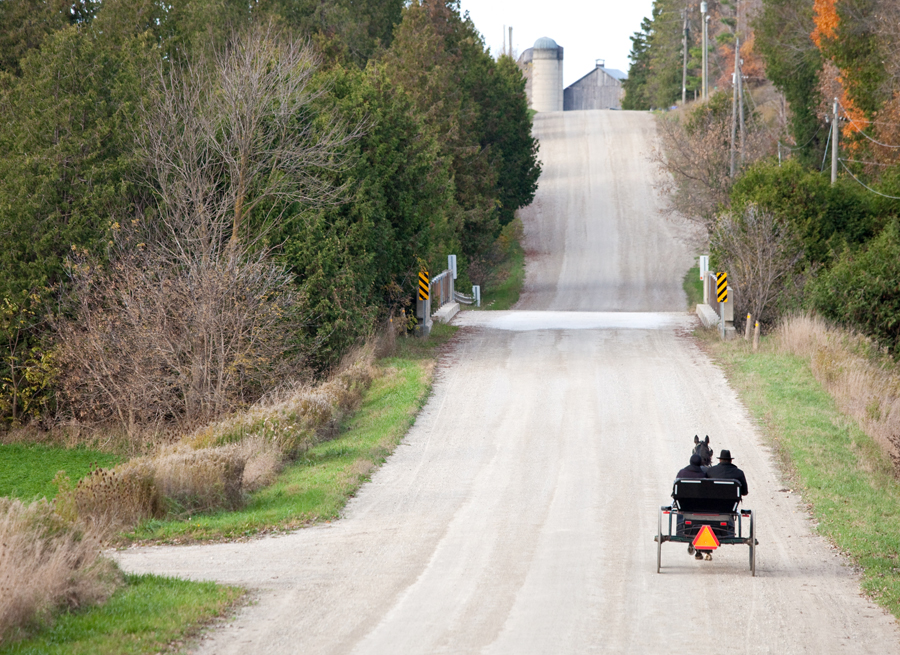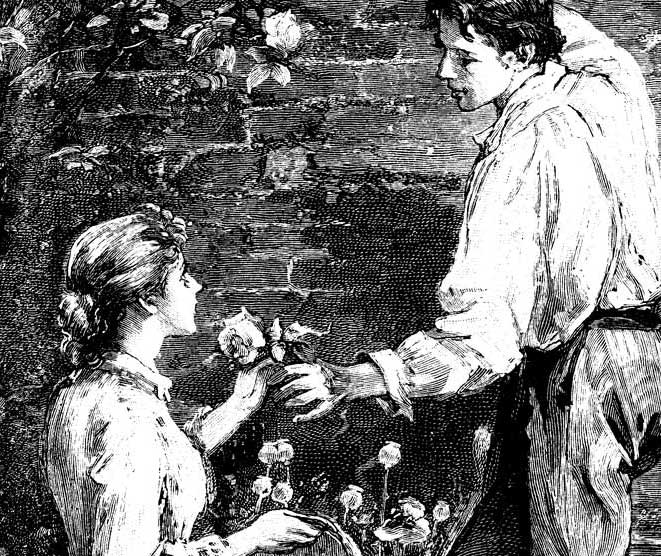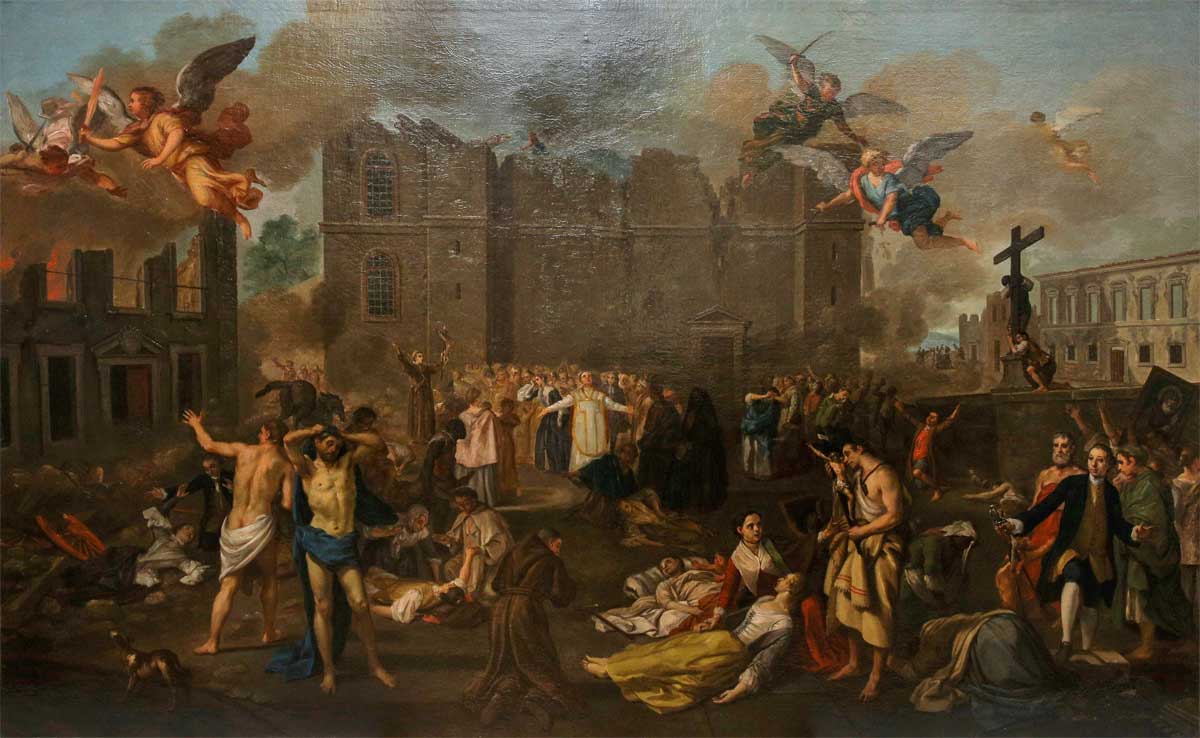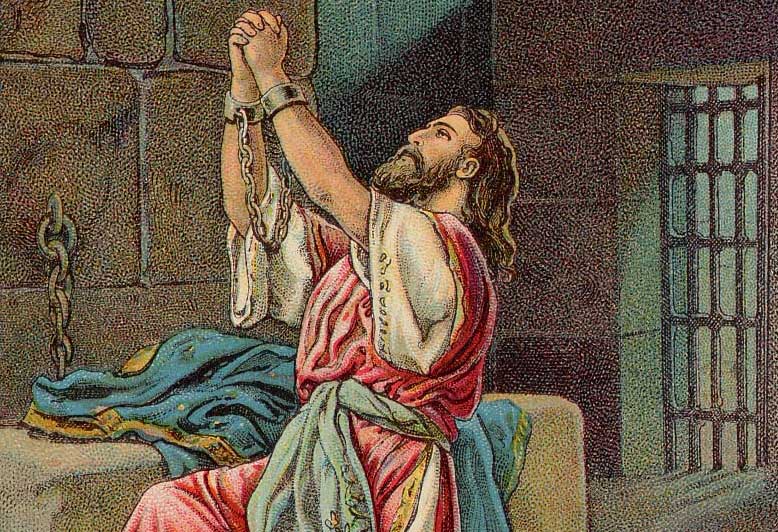Family & Christian Virtue in a Post-Christian World
Reflections on the Ecclesial Vision of John Chrysostom
by Vigen Guroian
Of the many quotable passages from the writings of St. John Chrysostom the one most often cited is located in his twentieth homily on Ephesians. It reads: “If we regulate our households [properly] . . . , we will also be fit to oversee the Church, for indeed the household is a little Church. Therefore, it is possible for us to surpass all others in virtue by becoming good husbands and wives.”1 Most often this passage has been invoked as proof text supporting high sacramental interpretations of marriage. Rarely has it become the occasion for a sustained discussion of what might best be described as Chrysostom’s ecclesial vision of the Christian family and household. That is the task of this essay. I also want to show how this vision helps to enable Christians to better understand what is truly at stake for the Church in the current debates over the family and moral values.
Chrysostom lived at a moment of genuine cultural crisis. The pagan culture of antiquity was in decline. Christianity had become a force with which to be reckoned. Yet views differed about what shape a future Christian culture might take. Chrysostom was among a minority of Christian voices, St. Basil having been another, who expressed serious misgivings about he emerging Christian order. Like Basil, he brought the spirit of monastic reform into his critique of society. He inveighed against the moral laxity and excessive preoccupation with material possession, power, and social status even among so-called Christians. Chrysostom’s ecclesiology powerfully expressed this reform spirit, as he struggled to steer a course which would lead neither to an imperial church nor a cake-frosting version of Christianity for the masses. His example is especially instructive for churches today as they themselves enter a definitively post-Christendom era marked by cultural deterioration. Christians are faced with difficult choices over how to relate to the emerging hegemonic secularity.
Chrysostom might easily have succumbed to the temptation to argue for the moral rehabilitation of the family as a means of securing societal stability. In our own time we hear repeatedly even from religious sources—Protestants, Roman Catholics, and Orthodox alike—that the family is of social value as a bulwark of societal stability. The presidential campaign of 1992 was replete with talk about family values and the importance of healthy and functional families to secure the promises of the American way of life. Less clear in the political rhetoric were the actual standards of this ideal American family and the sources of this family morality.
Chrysostom did not ignore the sociological dimension and function of the family. As he said on one occasion: “[W]hen harmony prevails [in the household], the children are raised well, the household is kept in order, and neighbors, friends and relatives praise the result. Great benefits, both for families and states, are thus produced.”2 He, however, subordinated this societal function to secondary or tertiary importance. The Christian family is primarily an ecclesial entity. Its calling is to the kingdom of God. In order to fulfill this vocation, the Christian family must practice a discipline of spiritual and moral askesis [practice]. Chrysostom was clear about the sources of a family’s morality. The source was Christ in his life and commandments.
Chrysostom’s vision of the ecclesial family was radical when he preached it in the fourth century, and it is equally radical in a post-Christian society. After Christendom, the church and spouses and parents can no longer depend upon a substantial residue of biblical and Christian values to subsist within the culture and be transmitted to the young apart from nurture within the community of faith. It ought to be obvious to Christian spouses and parents how truly radical their vocation as family is within contemporary society. Nevertheless what actually is entailed in being married “in the Lord” has frequently been forgotten. The printed and electronic media bombard Christians and non-Christians alike with powerful and seductive alternatives to the demanding, disciplined life to which the Christian family is called biblically and through the marital rites of the church. It is easy to think of the Christian family as merely a church-going version of those comfortable and idealized Cleaver and Huxtable families.
A lesson for our time taught by Chrysostom is that strenuous and sustained efforts must be made from within the churches to cultivate and restore the vision of the family as an ecclesial entity and mission of the kingdom of God. Sociologists tell us that increasingly, for vast numbers of Americans, family has lost its public meaning and outlook. Family is being redefined as a haven of private living, consumption, and recreation. A flight to privacy replaces civic-mindedness. Self-centeredness and hedonism replace personal sacrifice for children and community. Chrysostom’s ecclesial vision of family answers this deprivation of community, but in a fashion which can only look strange even to people who otherwise worry about the privatization and moral privation of family. For if from the sociologist’s or politician’s point of view the family has gone “out-of-joint” because it is not contributing as it should to the formation of viable community and civic virtue, Chrysostom reminds Christians that the Christian family is first a calling to community in service to God and his kingdom.
By looking at Chrysostom’s teachings on marriage and family through this prism, however, one is bound to bump into a much larger debate, quite at the center of contemporary Christian ethics. It is the debate over the general prospects for the Christian faith and ethics within a post-Christian world. There are those who cling to the hope that some version of a Christendom is still possible and that, therefore, Christian ethics can continue to be done in old and familiar ways of correlating Christian truth with norms and institutions found within the culture. There are others with the more modest hope of designing a new public theology for a pluralistic order. This search goes on in diverse and even opposing ideological camps, among neo-conservatives, mainline Protestants, and liberal as well as neo-Thomist Catholics. Others who are persuaded that Christendom has ended and never was a good idea in any case have turned to alternative models of a confessing church whose “main political task” lies “not in the personal transformation of individual hearts or the modification of society,” but rather, as Stanley Hauerwas and William H. Willimon have recently put it, “in the congregation’s determination to worship Christ in all things . . . and to build up an alternative polis”—that being the church.3 Between the contending parties accusations are flung back and forth over whether this or that proposed ecclesiology is overly accommodating towards the culture or irresponsibly sectarian.
Chrysostom helps us to see that this perennial question about the appropriate relationship of the church to the culture is reflected in microcosm within the empirical Christian family. With respect to the contemporary debate, I intend to demonstrate how Chrysostom’s way of stating the relation of family to church and church to culture eludes some of the easily uttered categories with which we have learned to pigeonhole others’ points of view. Chrysostom was neither sectarian, accommodationist, or triumphalist. He resisted the Eusebian Christian imperialism of the day. He was not taken with the Constantinian-Theodosian theocratic synthesis of church and state, which when later codified by Justinian, provided the ideological framework for Byzantine theocracy. Nor did Chrysostom propose that the church retreat into the catacombs. And he did not believe that the only pure and true Christianity was restricted to the monastery. Rather, Chrysostom’s idea of an evangelical and socially responsible Christian faith was bound up with his pastoral and moral theology as he addressed Christian parishioners and Christian rulers alike. In all that he said about the nature of the church/world relationship, Chrysostom returned again and again to the belief of the Fathers that salvation is accomplished from within the ecclesia through its process of making the kingdom of God present to an unbelieving world. For Chrysostom the family as an ecclesial entity figured centrally in this salvific process.
The “Ecclesial” Household
As Gerhardt B. Ladner has observed, by the end of the fourth century, especially in the East, “the ascetic and mystic and the ruler shared between them as it were true kingship. Reformed in the royal image of God, they represented two different but equally high orders of mankind.”4 The Constantinian-Theodosian initiatives to establish a Christian commonwealth formalized by the Emperor Justinian in the sixth century tipped the balance toward the latter. The emperors increasingly asserted a “quasi-sacerdotal position [for themselves] in the church, and generally made it understood that the value of all acts of reform in the Church and empire flowed directly from the fact that they were put into effect by, or on the command of, the emperor.”5
Early in his career Chrysostom resisted these trends toward imperial domination of the church and society. He did so by championing monastic claims of true “kingship” over the Eusebian conception of the king-philosopher. This is a clear aim of his short treatise, “A Comparison Between a King and a Monk” (c. 380). As Ladner states: “There was one great exception to the eastern development of [the] Basileia ideology: the thought and life of St. John Chrysostom.”6 The truly significant turn in Chrysostom’s thought came, however, as he struggled with his pastoral and homiletic duties at Antioch and later in Constantinople. In these settings, Chrysostom became convinced “that, apart from the privilege of marriage, the Christian who lived in the world had the same obligations as the monk.”7 In the midst of expounding an ecclesially centered interpretation of the Christian household as a mission of the kingdom of God in the world, he also anticipated and answered the later Byzantine alternatives of either conceiving of the church as the sacramental organism which whispers in the emperor’s ear and sacralizes an imperial order or the view that the monks are the only true representatives of holiness in a compromised and sinful world.
At the close of his Antiochene ministry, Chrysostom wrote the “Address on Vainglory and the Right Way for Parents to Bring Up Their Children” (c. 386-387). There he spoke “of a child’s soul as of a city in which the King of the universe intends to dwell and God’s earthly representative in this city is not the emperor, but the child’s father” [my emphasis]. “Nothing,” concludes Ladner, “could be less ’Eusebian’ than this conception of the Kingdom of God on earth, and it is not surprising that John Chrysostom perished as a martyr for Christian ethical principles in resistance”8 to the emerging and solidifying ideology of a Christian Empire.
From this point on, Chrysostom sought to “reform the ‘Polis’ within the ‘Basileia’,”9 observes Ladner. He increasingly identified the proleptic presence of the kingdom of God not primarily with empire or the cloistered monastery but with the near and familiar Christian household. The cardinal “marks” of the kingdom, Chrysostom insisted, are compassion, love of neighbor, and hospitality toward friends and strangers alike. The Christian household, he maintained, is an exact image of the ecclesia when it puts into practice the gospel teaching about our behavior toward one another and God.10
Chrysostom thought of the Abrahamic household as the ancient biblical type of the Christian “ecclesial” household. The Abrahamic household kept and practiced in an exemplary fashion those virtues of the kingdom of God which need to belong to the people of God in order that they may receive the Messiah when he comes. In homily 45 on The Acts of the Apostles, Chrysostom exhorted:
Make yourself a guest-chamber in your own house; set up a bed there, set up a table there and a candlestick. For it is not absurd, that whereas, if soldiers should come, you have rooms set apart for them, and show much care for them, and furnish them with everything, because they keep off from you the visible war of this world, yet strangers have no place where they may abide? Gain a victory over [prevail over] the Church . . . [S]urpass us in liberality: have a room to which Christ may come; say, “This is Christ’s cell; this building is set apart for Him. . . . Abraham received the strangers in the place where he abode himself; his wife stood in the place of a servant, the guests in the place of masters. He knew not that he was receiving Christ; knew not that he was receiving Angels; so that had he known it, he would have lavished his whole substance. But we, who know that we receive Christ, show not even so much zeal as he did who thought that he was receiving men. . . . Let our house [therefore] be Christ’s general receptacle. . . ”11
From this passage we are able to see that Chrysostom had in mind something even more concrete than the actual network of human family or household relations. The physical dwelling itself is realized as “Christ’s general receptacle.” Abraham’s tent is the Old testament type of Christian dwelling which has become the house of God. When the members of the household provide for guests and greet them in their home, the dwelling itself is the body of the Lord.
Elsewhere in his homilies on the Book of Acts, Chrysostom filled this metaphor of the house of God with its members and their relations. “Let the house be a Church, consisting of men and women. . . . ‘For where two,’ He saith, ‘are gathered together in My Name, there am I in the midst of them’” (Matt. 18:20).12 This household, which welcomes Christ and feeds and clothes him, is the inheritor of the kingdom of heaven. Hospitality should be sought in the selection of a spouse. Abraham sent his servant to his own country to find a wife for his son Isaac. And the servant determined through prayer that the girl he should choose would be one who not only offered him drink but also offered his camels drink (Gen. 24:11–14). The servant was sent looking for such a bride for Isaac, writes Chrysostom, because “everything good which ha[d] happened to . . . [the household] came because of hospitality. Let us not see only the fact that he asked for water, but let us consider that it shows a truly generous soul not only to give what is asked but to provide more than is requested.”13 This cultivation of a righteous household, he concludes, is a manner of seeking and receiving the kingdom of heaven. “‘Thou who receivedst Me,’ He saith, ‘into thy lodging, I will receive thee into the Kingdom of My Father; thou tookest away My hunger, I take away thy sins; thou sawest Me a stranger, I make thee a citizen of heaven; thou gavest Me bread, I give thee an entire Kingdom, that thou mayest inherit and possess.’”14
A quintessential New Testament example of an “ecclesial” household, said Chrysostom, was the home of Aquila and Priscilla. These two workers in the Lord unselfishly opened their home to St. Paul and Christ’s disciples. “[I]t was no small excellency [virtue], that they had made their very house a Church. . . . [And] Paul,” exhorts the Corinthian Christians to greet one another “with the holy kiss . . . as a means of union: for this unites, and produces one body.”15 As Gus Christo has summarized, for Chrysostom, “a Christian home’s transformation into the Church . . . , or a church, happens when its occupants salute each other with the holy kiss . . . , are hospitable to people and remain free of deceit and hypocrisy.”16 Such a home or church becomes a location from which Christ draws the rest of the public world into his kingdom. This in turn is described as a liturgical and sacramental action. “Charity,” Chrysostom once exclaimed, is “a sacrament. . . . For our sacraments are above all God’s charity and love.”17
The Christian Family as Mission of the Kingdom of God
In order to emphasize the larger ordained purposes and calling of the Christian family, Chrysostom repeatedly returned to the stories of the Abrahamic household, even Abraham’s willingness to follow God’s command and offer his only son in sacrifice.Yet the Old Testament story most often invoked by Chrysostom to illumine the unselfish and heroic qualities required by God of those who assume the office of parenthood is the story of Hannah and her son Samuel. Chrysostom’s use of the story shifted over the years from an early defense of monasticism to a later focus on the responsibility of Christian parents to attend consciously to raising their children as true Christians, and not just nominal ones.
In his early work, Against the Opponents of the Monastic Life, Chrysostom called upon parents to unselfishly raise their children as fit inheritors of the kingdom of heaven. This meant especially, though not exclusively, preparing them for the monastic life. Chrysostom described Hannah as an exemplar of such responsible and unselfish parenthood.
There was a Jewish woman named [H]Annah. [H]Annah gave birth to one child and did not expect to have another. Indeed, she had scarcely given birth to him, and this after many tears, for she was sterile. . . . When he no longer needed to be nursed, she immediately took him and offered him up to God, and she ordered him to return to his father’s house no longer, but to live continually in the temple of God.18
Hannah thus fulfilled the community’s office of a parent because she dedicated her son to God and to the well-being of his people. For “when God had turned away from the race of the Hebrews because of their profuse wickedness . . . , [Samuel] won back God’s favor through his virtue and persuaded him to supply what had been given previously. . . Such,” concluded Chrysostom “is always the reward for giving our possessions to God . . . , not only possessions and things, but our children.”19
More than a decade after these words were written, during his ministry in Antioch, or perhaps even later during his espicopacy at Constantinople, Chrysostom returned to the very same story in his twenty-first homily on Ephesians. In the midst of instructing parents on how to raise their children, he argued that it was not “necessary for . . . [the child] to be a monk.” It was enough to “[m]ake him into a Christian.”20 Of “the holy men and women of old” Hannah was the example “to imitate.” “[L]ook at what she did. She brought Samuel, her only son, to the temple, when he was only an infant!”21 Chrysostom now employed the story in order to emphasize the importance of raising children on Scripture. “Don’t say, ‘Bible reading is for monks; am I turning my child into a monk? . . . It is necessary for everyone to know Scriptural teachings, and this is especially true for children.”22
This shift in emphasis to instruction in how to raise children not to become monks but just to be good Christians is not at all inconsistent with Chrysostom’s earlier use of the Hannah and Samuel story in Against the Opponents of the Monastic Life. The cardinal obligation and task of Christian parenthood remains the same: to prepare the child for service to God and his people. “She [Hannah] gave Samuel to God, and with God she left him, and thus her marriage was blessed more than ever, because her first concern was for spiritual things.”23
In an ancient prayer of the Armenian rite of matrimony the priest beseeches God: “Plant them [the couple] as a fruitful olive tree, in the House of God, so that living in righteousness, in purity, and in godliness, according to the pleasure of Thy beneficent will, they may see the children of their children and they may be a people unto Thee” [my emphasis].24 This liturgical prayer emphasizes the ecclesial nature of Christian marriage and family. This is to seek the kingdom of God. To raise children in virtue and righteousness renders them “a people unto” God. In homily 44 on 1 Corinthians, Chrysostom quotes 1 Timothy 2:5: “‘[T]hey will be saved through bearing children, if they remain in faith and love and holiness, with modesty.’”25 Hannah’s “wisdom” was that she comprehended through faith that by dedicating to God “the first-fruits of her womb” she might “obtain many more children in return.”26 Her attention to spiritual things was not a retreat into the private self or family. It was an affirmation of the existence of a community of faith to which she belonged and in which she carried the divinely commissioned office of a parent. God in turn bestowed upon her the growing company of that community.
Ephesians 5 and the Ecclesial Marriage
The strongest statements by Chrysostom on the ecclesial and christic calling of Christian husbands and wives, fathers and mothers, comes not surprisingly in his homily on Ephesians 5. “Wives, be subject to your husbands, as to the Lord. For the husband is the head of the wife just as Christ is the head of the church, the body of which he is the Savior” (Eph. 5:22-23 NRSV). Feminist theologians have regarded the passage as a central piece of what they claim is the theologization of antiquity’s structures of domination.27 Others like John H. Yoder have maintained that there is more Christianizing of the marital relationship that the critics admit in this and other Haustafeln passages. Yoder argues that submission here assumes the character of a revolutionary subordination through the Pauline theology of agape and freedom in Christ.28
Virtually all who write on this passage, however, agree that it reflects the Pauline author’s strong interest in ecclesiology. As Elisabeth Schüssler-Fiorenza conjectures at one point in her analysis of Ephesians 5, “The reason for . . . [its] theological shortcomings might be the author’s interest in clarifying the relationship between Christ and the church, whose unity is his [the author’s] primary concern in the rest of the letter.”29 Chrysostom’s interpretation of this passage is strongly ecclesiological. He interprets it to establish a sacramental and even ontological relationship between the institution of marriage and the church. God’s economy is channeled in the first order through the body of Christ, the church. The peace of the world is guaranteed by the peace of that body. And the peace of the church is a discipline and task of the Christian family. The church itself is strengthened by the harmony and good order of a godly household. Thus, reasons Chrysostom, the wife does not obey the husband ultimately for “her husband’s sake,” but “primarily for the Lord’s sake . . . as part of . . . [her] service to the Lord.”30 And the husband will love his wife “not so much for her own sake, but for Christ’s sake.”31
After discussing the proper attitude of the wife toward her husband, Chrysostom considers the proper attitude of the husband toward his wife. Keeping in mind St. Paul’s analogy of the husband as the head of the wife, Chrysostom works together christic and ecclesial metaphors.
[Husbands] be responsible for the same providential care of . . . [your wife], as Christ is for the Church. And even if it becomes necessary for you to give your life for her, yes, and even to endure and undergo suffering of any kind, do not refuse. Even though you undergo all this, you will never have done anything equal to what Christ has done. You are sacrificing yourself for someone to whom you are already joined, but He offered Himself up for one who turned her back on Him and hated Him.32
Husband and wife both must imitate the Lord. But the greater burden is on the husband, precisely because he is in the position of greater power. He who would view himself as master is called upon to be servant in the likeness of Christ who is the head of the church. “What sort of satisfaction could a husband himself have, if he lives with his wife as if she were a slave, and not a woman of her own free will,” says Chrysostom. “Suffer anything for her sake, but never disgrace her, for Christ never did this with the Church.”33 In his condescending and sacrificial relationship to the church Christ becomes the example husbands must follow in their relationship to their wives “[I]mitate the Bridegroom of the Church.”34 Christ condescended to take the church as his bride. “So the Church was not pure. She had blemishes, she was ugly and cheap. Whatever kind of wife you marry, you will never take a bride like Christ did. . . . ; you will never marry anyone estranged from you as the Church was from Christ. Despite all this, he did not abhor or hate her for her extraordinary corruption.”35 Rather, Christ loved the church, in order that she might be sanctified (Eph. 5:25-27). The ecclesial metaphor reigns, even as Chrysostom gives strong advice about spousal attitudes and conduct within the marital relationship. Each, church and marriage, illumines the nature of the other.
In this theology, the Christian family figures as the primal and sacramental human community in which “kenotic” and “agapeic” love are learned and rehearsed. Within the conjugal relationship this love is shared between husband and wife, and they in turn by their parental care communicate this love to the children. Furthermore, the Christian family itself, rehearsed in and equipped with the right virtues, is an arena of ascetical combat with the demons of personal and public life. This askesis not only perfects persons but also deepens community.
The Virtues of the Christian Family
Chrysostom admired the historic virtue of classical culture. Yet he was not to be counted in the company of those Christian writers who thought that the classical and Christian virtues were identical, always complementary, or easily correlated with each other. Rather, when Chrysostom looked out at the culture, he saw that Christians were captives to its man-centered standards of success and happiness. he pleaded with Christian parents to nurture another kind of character in their children. In homily 21 on Ephesians Chrysostom exhorted:
If a child learns a trade, or is highly educated for a lucrative profession, all this is nothing compared to the art of detachment from riches; if you want to make your child rich, teach him this. He is truly rich who does not desire great possessions, or surrounds himself with wealth, but who requires nothing. . . Don’t worry about giving him an influential reputation for worldly wisdom, but ponder deeply how you can teach him to think lightly of this life’s passing glories, thus he will become truly renowned and glorious. . . . Don’t strive to make him a clever orator, but teach him to love true wisdom. He will not suffer if he lacks clever words, but if he lacks wisdom, all the rhetoric in the world can’t help him. A pattern of life is what is needed, not empty speeches; character, not cleverness; deeds, not words. These things secure the Kingdom and bestow God’s blessings.36
Stoic influences alone cannot account for this passage. The beatitudes, which Chrysostom described as the very constitution of the kingdom of God, lie very near to its surface, together with a biblically founded eschatological hope.
The Bible, said Chrysostom, is the basic primer and lesson book for the virtues of the kingdom which God charges parents to teach their children. Scripture provides the narrative of the lives of patriarchs and matriarchs, parents and siblings, who struggled in God's presence to maintain a way of life distinct though not necessarily separate from the world. In Address on Vainglory and the Right Way for Parents to Bring Up Their Children, Chrysostom pioneered what might be regarded as one of the first Christian curriculums for children's bible study. The responsibility for such education, however, resides first with the parents. Chrysostom commended, especially, the stories of Cain and Abel, Jacob and Esau, Joseph and his brothers, Hannah and Samuel and the like. His method, as well as the subject matter, is worth looking at.
Much of Chrysostom’s discussion is concerned with identifying biblical models for relations between parents and children and of siblings with each other. For example, he encourages parents to juxtapose the stories of Cain and Abel and of Jacob and Esau in the manner of a diptych, drawing out the distinct lessons of each story as well as the common themes within both narratives of sibling rivalry, envy and fratricide. The parents must tell the stories of Cain and Abel and Jacob and Esau, not once but repeatedly. Then they should ask the child:
“Tell me the story of those two brothers.” And if he begins to relate the story of Cain and Abel, stop him and say: “It is not that one that I want, but the one of the other two brothers, in which the father gave his blessing.” Give him hints but do not as yet tell him their names. When he has told you all, spin the sequel of the yarn, and say: “Hear what occurred afterwards. Once again the elder brother, like in the former story, was minded to slay his brother. . .”37
In his twenty-first homily on Ephesians, Chrysostom gave his rationale for such instruction and pleaded its importance to Christian living:
Don’t think that only monks need to learn the Bible; children about to go into the world stand in greater need of Scriptural knowledge. A man who never travels by sea doesn’t need to know how to equip a ship, or where to find a pilot or a crew, but a sailor has to know all these things. The same applies to the monk and the man of this world. The monk lives an untroubled life in a calm harbor, removed from every storm, while the worldly man is always sailing the ocean, battling innumerable tempests.38
From the perspective of Chrysostom’s vision of Christian family and virtue, strategies for the revitalization of the family and preservation of society based on the Constantinian model are theologically misdirected. Once one defines Christian existence and tradition in such sociological terms a certain kind of ecclesiology and definition of Christian family emerge. The family is defined as a training ground for virtues which first have to do with the well-functioning of the secular polity—a worthy goal, but not what lies at the heart of the vocation of Christian parenthood and family. Nor in these post-Christendom times is it helpful, as liberal Protestants and liberal Roman Catholics are inclined to answer the privatism in the American family with immediate calls for family social ministry.39 The Christian family—which itself has been weakened and secularized by powerful cultural forces of privatism, narcissism, and consumerism—is not a likely agent of social change in any case.
There is a necessary interim step which is missing in such calls for a Christian family committed to social transformation. What gave the Christian family the capacity to have a public vocation was first a sense of being engaged in the struggle for the kingdom of God. The jargon of the Christian activists: intimacy, shared decision making, peacemaking cooperative projects, and the like, is hardly distinctive; nor is it in advance of the other kinds of progressivism in the culture which fail to provide a transcendent imperative for ethical behavior. Chrysostom would have it another way:
“When we teach our children to be gentle, to be forgiving, to instill virtue in their souls, we reveal the image of God within them. This then is our task: to educate both ourselves and our children in godliness; otherwise what answer will we have before Christ’s judgment seat? . . . [H]ow [else] can we be worthy of the kingdom of heaven?”40
Reclaiming the Vision
There exists a great need in the Christian churches today for ecclesial formation. For they stand to become increasingly dissipated if they continue to depend for strength upon cultural supports of Christian faith which are no longer present. This ecclesial formation must not be for its own sake but should prepare believers to greet the Groom when he returns. If Chrysostom was right about the Christian family as a vocation of the kingdom, then it behooves us in this time and place to reclaim that vision. Christian family once again must become a training ground in which—by becoming good husbands and wives, fathers and mothers, and children of the same—we become “fit to oversee the Church” and good “housekeepers” of God’s now and future kingdom.
If, with Chrysostom, we need to regard the church as in controversy and cooperation with the broader society and not merely as a cult preoccupied with itself and so-called spiritual matters, then we will begin to appreciate anew the special value of Chrysostom’s vision of the “ecclesial” family for the re-formation of the church and the introduction of a new discipline into its life for the salvation of the world.
Notes:
1. John Chrysostom, St. John Chrysostom on Marriage and Family Life, trans, Catherine P. Roth and David Anderson (Crestwood, NY: St. Vladimir’s Seminary press, 1986), p. 57.
2. Ibid., p. 44.
3. Stanley Hauerwas and William H. Willimon, Resident Aliens; Life in the Christian Colony (Nashville, TN: Abingdon Press: 1990), pp. 45–46.
4. Gerhardt B. Ladner, The Idea of Reform (New York: Harper and Row Publishers, 1967), p. 125.
5. Ibid., p. 126.
6. Ibid., p. 125–126.
7. Ibid., p. 127.
8. Ibid., p. 129.
9. Ibid.
10. I have learned much about this from Gus George Christo’s dissertation, “The Church’s Identity Established Through Images According to St. John Chrysostom” (Ph.D. dissertation, University of Durham, 1990). Christo’s work has alerted me to a number of passages which I cite from Chrysostom below.
11. John Chrysostom, The Homilies of St. John Chrysostom on the Acts of the Apostles, in A Select Library of Nicene and Post-Nicene Fathers of the Christian Church, First Series, vol. 11 (Grand Rapids, MI: Wm. B. Eerdmans Publishing Co., 1956), p. 277 [homily 45].
12. Ibid., p. 127 [homily 26].
13. Chrysostom, Chrysostom on Marriage, pp. 103–104.
14. Chrysostom, “Homilies on Acts,” p. 276 [homily 45].
15. John Chrysostom, “First Epistle of St. Paul the Apostle to the Corinthians,” in The Homilies of St. John Chrysostom, Part II (Oxford and London: John Henry Parker: J. G. F. and J. Rivington, 1839), p. 620.
16. Christo, “Church’s Identity,” p. 386.
17. I have used Emilianos Timiadis’s translation of this passage as it appears in his “Restoration and Liberation in and by the Community,” Greek Orthodox Theological Review 19, no. 2 (Autumn 1974): 54. See also John Chrysostom, Homilies on the Gospel of St. Matthew, in A Select Library of Nicene and Post-Nicene Fathers of the Christian Church, vol. 10 (Grand Rapids, MI: Wm. B. Eerdmans Publishing Co., 1956), pp. 434–435 (homily 71).
18. John Chrysostom, A Comparison Between a King and a Monk/Against the Opponents of the Monastic Life, trans. David G. Hunter (Lewiston, NY / Queenston, Ontario: The Edwin Mellon Press, 1988), p. 171 (book 3).
19. Ibid., p. 171–172.
20. Chrysostom, Chrysostom on Marriage, p. 67.
21. Ibid., p. 68.
22. Ibid.
23. Ibid.
24. The Blessing of Marriage or The Canon of the Rite of Holy Matrimony According to the Usage of the Armenian Apostolic Orthodox Church (New York: Armenian Church Publications, 1953), p. 56.
25. Chrysostom, Opponents of Monastic Life, p. 172.
26. Chrysostom, Chrysostom on Marriage, p. 67.
27. Elisabeth Schüssler-Fiorenza, In Memory of Her (New York: The Crossroad Publishing Co., 1988), esp. pp. 266–270.
28. John H. Yoder, The Politics of Jesus (Grand Rapids, MI: Wm. B. Eerdmans Publishing Co.: 1972), esp. pp. 174–175, 180–181, 190–192.
29. Fiorenza, Memory, p. 270.
30. Chrysostom, Chrysostom on Marriage, p. 45.
31. Ibid., p. 58.
32. Ibid., p. 46.
33. Ibid., p. 47.
34. Ibid., p. 48.
35. Ibid., p. 47.
36. Chrysostom, Chrysostom on Marriage, p. 69.
37. Chrysostom, An Address on Vainglory and the Right Way for Parents to Bring Up Their Children, appended to L. W. Laistner, Christianity and Pagan Culture (Ithaca, NY: Cornell University Press, 1951), pp. 106–107.
38. Chrysostom, Chrysostom on Marriage, p. 69.
39. See, for example, James and Kathleen McGinnis, “The Social Mission of the Family,” in Faith and Families, ed. Lindell Sawyers (Philadelphia: The Geneva Press, 1986), pp. 89–113.
40. Chrysostom, Chrysostom on Marriage, p. 71.
This article is adapted from a chapter in Ethics After Christendom: Toward an Ecclesial Christian Ethic.
Vigen Guroian was, until his retirement, Professor of Religious Studies in Orthodox Christianity at the University of Virginia in Charlottesville. His books include Tending the Heart of Virtue: How Classic Stories Awaken a Child's Moral Imagination (2002) and The Orthodox Reality: Culture, Theology, and Ethics in the Modern World (Baker Academic, 2018).
subscription options
Order
Print/Online Subscription

Get six issues (one year) of Touchstone PLUS full online access including pdf downloads for only $39.95. That's only $3.34 per month!
Order
Online Only
Subscription

Get a one-year full-access subscription to the Touchstone online archives for only $19.95. That's only $1.66 per month!
bulk subscriptions
Order Touchstone subscriptions in bulk and save $10 per sub! Each subscription includes 6 issues of Touchstone plus full online access to touchstonemag.com—including archives, videos, and pdf downloads of recent issues for only $29.95 each! Great for churches or study groups.
Transactions will be processed on a secure server.
more on family from the online archives
more from the online archives
calling all readers
Please Donate
"There are magazines worth reading but few worth saving . . . Touchstone is just such a magazine."
—Alice von Hildebrand
"Here we do not concede one square millimeter of territory to falsehood, folly, contemporary sentimentality, or fashion. We speak the truth, and let God be our judge. . . . Touchstone is the one committedly Christian conservative journal."
—Anthony Esolen, Touchstone senior editor












